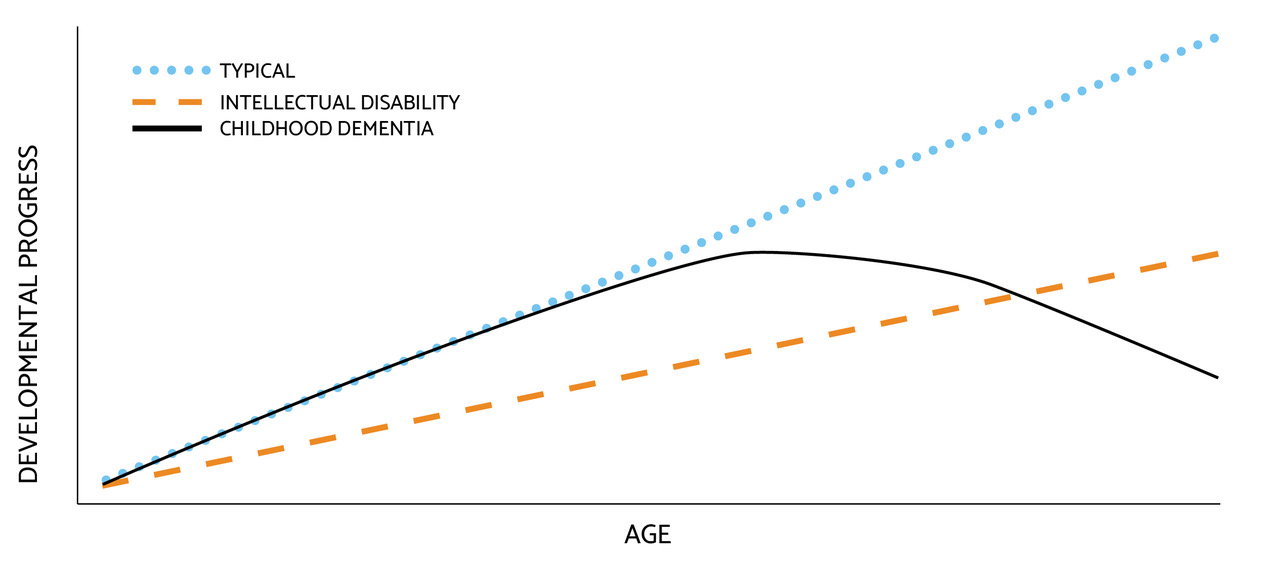Understanding childhood dementia
For health and care professionals
Understanding childhood dementia
Families' lived experience
Working with families
On this page:
Below you will find information and resources on childhood dementia for health and care professionals.
They’re designed to give you a broad understanding of childhood dementia.
Stay up to date and connected
We can notify you when new resources become available and keep you up to date on emerging research, news and progress for children with dementia. Let us know where to reach you and keep you updated.
What is childhood dementia?
The term childhood dementia is an umbrella term, representing a group of genetic conditions which cause neurocognitive decline. You can see the list of conditions known to cause dementia here.
Developmental trajectories of individuals with typical development, intellectual disability and childhood dementia.

The trajectory of childhood dementia classically proceeds in line with normal development for a long or short interval then decelerates and ultimately regresses (adapted from Haugen et al., 2019).
Childhood dementia facts and statistics

1 in every 2,900 babies
is born with a condition that causes childhood dementia

CHILDHOOD DEMENTIA RESULTS FROM PROGRESSIVE BRAIN DAMAGE CAUSED BY 100+ GENETIC CONDITIONS

Children with dementia experience:
- Memory loss
- Confusion
- Trouble concentrating, understanding, learning and communicating
- Personality changes
- Severely disturbed sleep
- Behavioural issues such as hyperactivity
- Emotional issues like anxiety and fear

HALF OF ALL CHILDREN WITH DEMENTIA DIE BY THE AGE OF 10.

Childhood dementia is progressive.
Children lose their ability to talk, walk, read, write and play, and eventually the body loses its ability to function.

Symptoms can vary and progress over months, years or even decades, impacting both the child and their family.

Estimated in Australia every year:
91 deaths in people with childhood dementia
92 deaths from childhood cancer (0-14 yrs)

Estimated in the USA every year:
1,077 deaths in people with childhood dementia
1,050 deaths from childhood cancer (0-14 yrs)

Estimated in the UK every year:
204 deaths in people with childhood dementia
260 deaths from childhood cancer (0-14 yrs)
Statistics from: Elvidge KL, Christodoulou J, Farrar MA, Tilden D, Maack M, Valeri M, Ellis M, Smith NJC; Childhood Dementia Working Group. The collective burden of childhood dementia: a scoping review. Brain. 2023 Jul 20:awad242. doi: 10.1093/brain/awad242. Epub ahead of print. PMID: 37471493. https://doi.org/10.1093/brain/awad242
Resources
The causes, symptoms, impacts, and prevalence of childhood dementia: a 3-minute introduction
Presentation: An introduction to childhood dementia
Childhood dementia fact sheet
This fact sheet gives an overview of key statistics on childhood including prevalence and incidence.
Presentation: an introduction to childhood dementia
This PowerPoint presentation was developed so that you can help build broader awareness and understanding of childhood dementia. It gives an overview of childhood dementia including prevalence, incidence, symptoms and mortality.
Facilitator's guide
This Facilitator's Guide accompanies the presentation 'An Introduction to Childhood Dementia'. It is intended to assist the facilitator to present an information session of 30 minutes to 60 minutes in length, depending on the depth of discussion and level of interaction of participants.
Learn more
- See a list of the conditions that cause childhood dementia.
- The Childhood Dementia Knowledgebase is a database containing all the essential information about the conditions that cause childhood dementia, gathered from the literature and with input from experts in the field. This is a free resource.
- The collective burden of childhood dementia: a scoping review, gives information on the conditions that cause childhood dementia, how common they are and their characteristics.
References
Elvidge KL, Christodoulou J, Farrar MA, Tilden D, Maack M, Valeri M, Ellis M, Smith NJC; Childhood Dementia Working Group. The collective burden of childhood dementia: a scoping review. Brain. 2023 Jul 20:awad242. doi: 10.1093/brain/awad242. Epub ahead of print. PMID: 37471493. https://doi.org/10.1093/brain/awad242
Haugen PK, von Tetzchner S, Oxley JD, Elmerskog B. Dementia in Adulthood and Childhood. In: von Tetzchner S, Elmerskog B, Tøssebro A-G, Rokne S, editors.Juvenile Neuronal Ceroid Lipofuscinosis, Childhood Dementia and Education: Intervention, education and learning strategies in a lifetime perspective. Norway: Snøfugl Forlag; 2019. p. 76
Nunn K, Williams K, Ouvrier R. The Australian Childhood Dementia Study. Eur Child Adolesc Psychiatry 2002; 11: 63–70.
Stay up to date on new resources and developments
Tell us how to reach you, and we'll notify you about new resources and developments.







